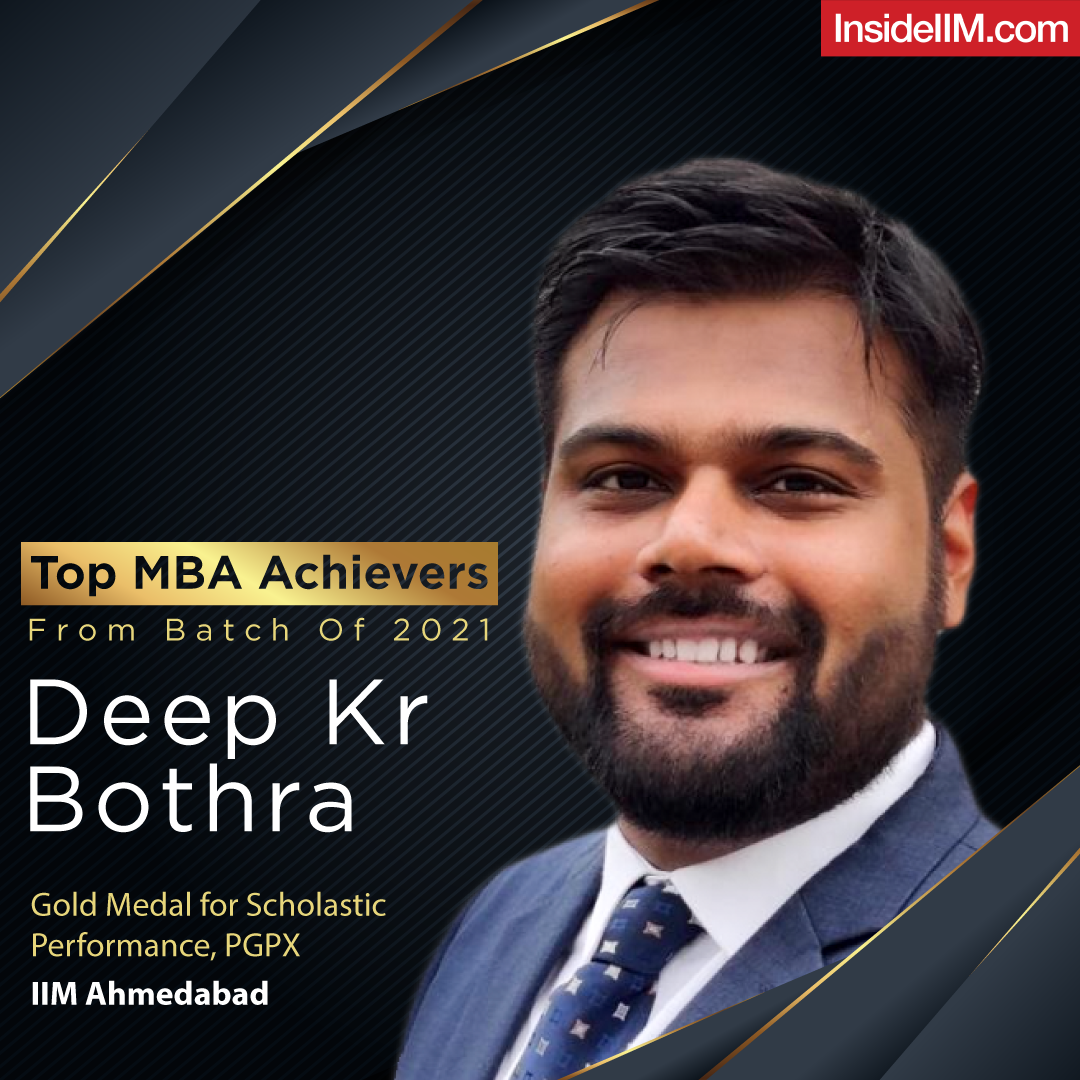Every year, a selected group of people with a wide variety of backgrounds from industries enter IIM Ahmedabad's PGPX program after a rigorous selection process. With the average work ex being over 8 years for the batch, and the candidates having worked at senior level positions at some of the best companies in the country, you can just imagine the level of competence that these students have. Amongst them to become a Gold Medalist at the end of the year is no easy task. This is exactly what Deep Bothra managed to do. He was awarded the Gold Medal for Scholastic Performance, PGPX for the batch of 2021 at IIM Ahmedabad. Find out about his journey, his focus during the course, his motivation to perform, and his advice to the incoming class of 2023.

Q1. Please tell us about your educational and professional background, and what drew you to pursue an MBA.
I am a Chartered Accountant, and I have cleared all levels of CFA and FRM. I graduated from St. Xavier's College (Kolkata) and did my schooling from Don Bosco, Liluah (West Bengal).
I was part of EY for 8.5 years. At the time of exit, I was an AVP/Manager in the Valuation, Modeling & Economics division (part of the Strategy & Transactions department). At EY, I worked with cross-functional and international teams to serve Indian and MNC clients.
Since my academic and professional background is primarily finance-focused, I pursued MBA to get a better understanding of the various aspects of a business.
Q2. Please tell us about your journey to IIM A, from preparing for exams to finally joining IIM Ahmedabad.
I prepared for GMAT after office hours and on weekends. It took me about 2-3 months.
During my IIM interviews, the discussions revolved around my work-ex, my company, views on corporate and political issues. We also discussed various hypothetical scenarios of ethical dilemmas, and how I will handle those situations.
Q3. When you entered IIMA, did you expect to win the award? What did you expect from the program?
I aimed to focus on learning and networking. I took academics seriously but I did not focus on the outcome. I was pleasantly surprised when the results were announced.
I joined the PGPX program since I had heard about the esteemed faculty members of IIMA. Further, I knew that PGPX consists of a batch of 140 participants who come from diverse cultural, academic, and professional backgrounds. Given that the average work-ex of a PGPX batch is more than 8 years, I expected the exchange of ideas on various contemporary topics outside the classroom, and engaging discussions during simulation games. The program met my expectations.
Q4. Given that only the crème de la crème of India makes it to IIMA, could you give us an idea of the degree of competitiveness at IIM Ahmedabad?
My cohort at PGPX consisted of professionals who are experts in their field. Everyone was doing well in professional life. Some even held senior positions like VP/product manager. My batchmates were high performers and competitive but all of us gave priority to peer learning. We helped each other via industry-specific webinars, clubs, and committees.
Q5. What did you do differently and how did you study differently that helped you win the Gold Medal?
Given my background in consulting, I like problem-solving and presenting solutions. I was active in class participation and I also took active participation in group projects since it helped me to work closely with my peers. I took non-fin electives like marketing, digital transformation, and took it as a challenge to get a good grasp of these subjects.
Q6. How does an MBA student balance studies and extra-curricular activities at b-school? Is it possible to balance the two, or must one be sacrificed for another? How did you bring about a balance?
It is difficult but not impossible to balance studies and extra-curricular activities. I was part of the core committee of the FinX club of PGPX, and I also conducted virtual quizzes for the FinX and Marketing club.
Q7. What were your, your family's and your friends' reactions when you won the award? How did you celebrate?
My family, friends and ex-colleagues were elated to hear the news since it is a once-in-a-lifetime event. Given COVID, I was not able to meet them in person but I called/messaged many people to thank them for their contribution during various phases of my life.
Q8. Regarding b-school life and academics, what are three crucial pieces of advice you would like to share with the incoming class of 2023?
- In the corporate world, seniors expect results with no/minimal scope of error, however, this is not the case in B-school. Hence MBA students should not fear to get out of their comfort zone, experiment, and make mistakes.
- Network with batchmates: Though one should try to interact with everyone in the batch, it is also important to build strong ties with few batchmates – ties that are expected to last for a lifetime. The more heterogeneous the group, the better it is.
- Academic literature needs to be supplemented with the latest happenings in the corporate world. So, one should remain up to date.
